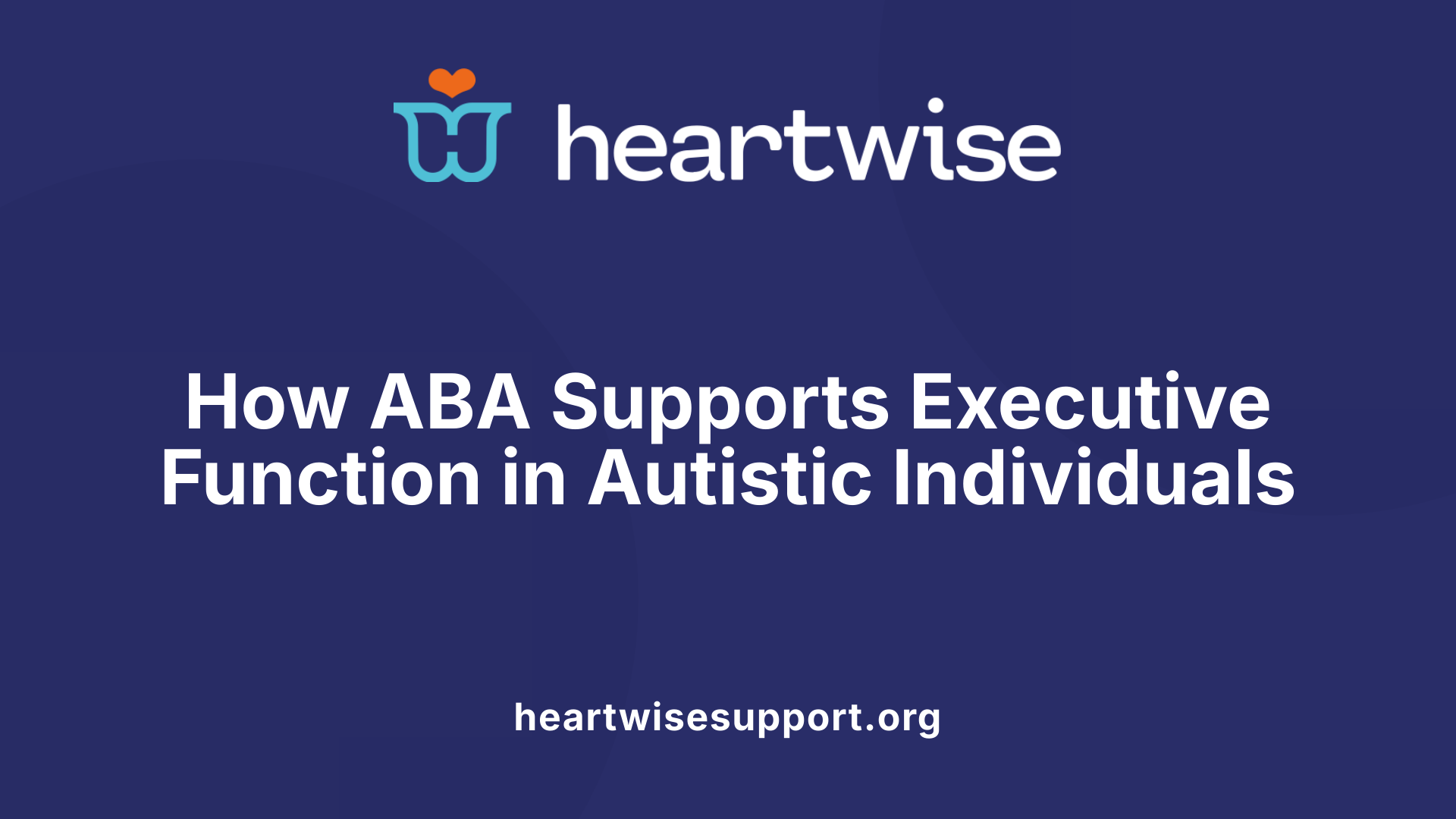Understanding Executive Function and Its Impact
Executive functioning skills are critical cognitive processes that enable individuals to plan, organize, regulate emotions, and adapt to new situations. These skills include inhibitory control, working memory, cognitive flexibility, planning and organization, task initiation, self-monitoring, and emotional regulation. Delays or deficits in these areas can lead to difficulties in daily activities, academic performance, and social interactions. Particularly for autistic individuals, challenges in executive functioning can manifest as trouble maintaining focus, transitioning between activities, and flexible thinking, which can impact overall independence and quality of life.
The Role of ABA in Developing Executive Skills

How can ABA be used to enhance executive function skills?
Applied Behavior Analysis (ABA) plays a vital role in improving executive functioning skills by focusing on specific behaviors that contribute to independence and daily functioning. Therapists utilize structured, evidence-based strategies to teach skills like planning, organization, task initiation, and cognitive flexibility.
ABA interventions are often tailored to each individual’s needs, using clear and measurable goals. Techniques such as task analysis break down complex skills into smaller, observable actions. Reinforcement strategies motivate children to practice and master these behaviors, ensuring skill maintenance and generalization.
The use of visual supports, including visual schedules and checklists, helps children understand what is expected and reduces anxiety. Timers encourage time management, while self-monitoring encourages awareness of progress.
Early intervention is particularly effective. It helps in establishing foundational skills like working memory, impulse control, and emotional regulation—skills that support future independence. These interventions often involve chaining, where steps of a task are linked together, and differential responding, which reinforces correct behaviors.
Additionally, ABA incorporates techniques like social stories and problem-solving activities to foster flexible thinking and emotional regulation. Therapists collaborate closely with families, educators, and other professionals to adapt strategies, ensuring ongoing progress.
Regular assessment and progress tracking guide intervention adjustments, emphasizing the importance of a comprehensive, professional, and personalized approach to support executive functioning development.
Understanding Executive Dysfunction and How ABA Addresses It

What is executive dysfunction and how can ABA address it?
Executive dysfunction involves difficulties with cognitive processes that are essential for managing daily activities and social interactions. These processes include planning, organizing, impulse control, flexible thinking, and self-regulation. Individuals with executive challenges often struggle with completing tasks, managing emotions, and adapting to change, which can affect their academic performance, social relationships, and daily independence.
Applied Behavior Analysis (ABA) offers effective strategies to help mitigate these difficulties. ABA uses a structured approach focused on teaching and reinforcing specific executive skills systematically. Therapists employ techniques such as task analysis to break complex skills into manageable parts, visual supports like schedules and cues to enhance understanding, and goal setting with progress monitoring to motivate improvement.
Reinforcement strategies are central to ABA interventions. These include positive reinforcement for successful task completion and self-monitored behaviors, fostering motivation and independence. ABA also incorporates environmental modifications—such as adjusting the classroom or home setup—to support skill development and emotional regulation.
Interventions target particular challenges like impulsivity, motor behaviors, and sensory processing issues. Therapists teach alternative, more appropriate behaviors and use approaches like desensitization to reduce sensory sensitivities. Through modeling and teaching coping strategies, ABA helps individuals develop better executive functioning, leading to improved problem-solving, adaptive functioning, and goal-directed behavior in diverse settings.
Ultimately, ABA aims to enhance overall independence and quality of life by addressing core executive dysfunction challenges through evidence-based, personalized interventions.
Strategies and Techniques to Enhance Executive Skills with ABA

What strategies and techniques within ABA can be used to improve executive functioning?
Applied Behavior Analysis (ABA) offers a range of evidence-based strategies that effectively target and enhance executive skills such as planning, organization, emotional regulation, and cognitive flexibility. These interventions focus on helping children develop the skills necessary for independence and successful daily functioning.
One fundamental approach is task analysis, where complex tasks are broken down into smaller, manageable steps. This stepwise process makes it easier for children to understand and complete activities, improving task initiation and persistence.
Visual supports play a vital role in ABA-based interventions. Tools like visual schedules, cue cards, and color-coded materials provide clear visual cues that aid in understanding routines, managing time, and organizing tasks. These cues serve as constant reminders, reducing anxiety and promoting independence.
Reinforcement strategies are central to ABA therapy. Positive reinforcement, such as praise, tokens, or preferred activities, encourages the repetition of desired behaviors, including successful task completion and emotional regulation. Reinforcements are tailored to motivate the individual while fostering persistence and motivation.
Self-regulation and goal-setting are integrated into ABA programs. Children are taught to monitor their behaviors, recognize emotional states, and set achievable goals. Techniques include self-monitoring checklists, modeling appropriate responses, and employing calming strategies like breathing exercises.
Prompting and shaping are used to gradually develop skills. Prompts may include visual hints or physical guidance, which are gradually faded as the child gains independence. Shaping involves reinforcing successive approximations toward the target behavior, such as moving from simple responses to more complex task planning.
Natural environment teaching brings intervention into everyday settings like home and school. This contextual approach helps children generalize skills across settings and stakeholders, ensuring lasting improvements.
Additional tools include social stories to prepare for changes, relaxation training to manage anxiety, and behavioral contracts to set expectations. All strategies are personalized, regularly monitored by trained behavior analysts, and adapted to meet each child's unique needs.
Incorporating these ABA techniques facilitates the development of critical executive functions, supporting children in achieving greater self-management, academic success, and social engagement.
Assessment of Executive Function Skills in ABA
How are executive function skills assessed within ABA therapy?
Executive function skills are crucial for daily success and are thoroughly evaluated in ABA therapy to tailor interventions effectively. This assessment involves multiple methods to ensure a comprehensive understanding of each child's unique strengths and challenges.
One primary approach is direct observation in natural environments such as home, school, or community settings. This allows therapists to see how children manage tasks like planning, problem-solving, attention regulation, and flexibility in real-life situations. These observations help identify specific difficulties in daily routines and social interactions.
In addition to observational data, standardized assessment tools are employed to measure various components of executive functioning. Instruments like the Behavior Rating Inventory of Executive Function (BRIEF), the Test of Variables of Attention (TOVA), Stroop Test, Wechsler Intelligence Scale for Children (WISC), and ENFEN battery are commonly used. These tests provide objective scores on functions such as working memory, inhibitory control, cognitive flexibility, and planning.
Beyond assessments, analyzing work samples and task performance offers insight into a child's ability to initiate, complete, and organize activities. Functional Behavior Assessments (FBAs) are also conducted to understand the environmental and contextual factors influencing executive skills. This holistic approach helps identify specific deficits and guides targeted intervention strategies.
The goal of these varied assessment methods is to gather detailed, ecologically valid information that reflects everyday functioning. By doing so, ABA therapists can design precise, effective interventions aimed at developing executive skills essential for independence and success across settings.
Benefits of ABA in Supporting Executive Function, Especially for Autistic Individuals

How does ABA support executive functioning skills?
Applied Behavior Analysis (ABA) offers a structured, evidence-based approach to developing critical executive skills in autistic individuals. Through targeted interventions, ABA helps improve abilities such as planning, organization, emotional regulation, and flexibility.
ABA uses positive reinforcement and other behavioral strategies to encourage desirable behaviors. For example, therapists might reward a child for initiating a task or managing emotions, helping to build these skills systematically.
How does ABA contribute to increased independence?
By strengthening executive functioning skills, ABA promotes greater independence in daily activities. Children learn to manage time, organize tasks, and regulate emotions more effectively, enabling them to take on responsibilities with less support.
What role do visual supports and routines play?
ABA integrates visual tools like schedules and cues, which provide predictability and clarity. These supports assist children in understanding expectations, transitioning between activities, and following routines, all of which enhance their executive functioning.
How does ABA improve social participation and learning?
Developing executive skills through ABA not only improves daily functioning but also boosts social interactions. Improved self-regulation and cognitive flexibility help children adapt to social situations and participate actively in learning environments, promoting better relationships and academic success.
| Aspect | Benefits | Examples |
|---|---|---|
| Independence | Managing daily tasks confidently | Dressing, meal prep, self-initiating activities |
| Skill development | Planning, organization, emotional regulation | Using visual schedules, mindfulness exercises |
| Behavioral strategies | Reinforcement to shape desirable outcomes | Rewards for task completion, calm behavior |
| Environmental supports | Visual cues and routines enhance learning | Color-coded systems, timers, checklists |
| Social and learning growth | Greater participation and adaptive skills | Group activities, social stories |
Utilizing ABA to strengthen executive functions offers a comprehensive pathway for autistic individuals to achieve greater self-sufficiency and social engagement, ultimately enriching their quality of life.
Developing and Maintaining Executive Skills with ABA

How can ABA be used to develop and strengthen executive functioning skills?
Applied Behavior Analysis (ABA) offers a structured, evidence-based approach to improving executive functioning skills. Therapists use visual supports, routines, and task breakdowns to help individuals learn essential skills like planning, organization, and cognitive flexibility.
One effective method within ABA is the use of discrete trials, which allow for repeated practice of specific behaviors in a controlled setting. Reinforcement strategies, such as praise or tokens, motivate learners to engage and persist in developing new skills.
Visual supports, including timers, checklists, and schedules, help individuals understand and manage their time better, transition between tasks smoothly, and prioritize activities. Breaking down complex tasks into smaller, manageable steps makes learning less overwhelming and enhances the person's ability to complete activities independently.
Moreover, ABA therapists incorporate problem-solving games, role-playing, and at-home exercises to promote generalization, ensuring that skills transfer across environments and are maintained over time.
Collaboration with families and educators is vital. It allows for tailored interventions, consistent reinforcement across settings, and ongoing progress monitoring, all of which contribute to meaningful development of executive functions.
Structured routines and visual supports
Structured routines provide predictability, which reduces anxiety and helps individuals with autism or developmental delays navigate daily tasks. Visual schedules lay out daily activities clearly, supporting independence and emotional regulation.
Task breakdown and goal-setting
Dividing tasks into small steps makes challenging activities accessible. Setting specific, achievable goals fosters motivation and provides a clear path to success.
Use of reinforcement and motivational strategies
Positive reinforcement encourages the repetition of desirable behaviors. Using rewards tailored to individual interests boosts engagement and skill acquisition.
Collaboration with families and educators
Interdisciplinary teamwork ensures consistent intervention, facilitates skill generalization, and creates supportive environments both at home and school.
Generic tools like apps and calendars
Utilizing digital tools, such as visual schedule apps (e.g., Choiceworks) and organizational apps (e.g., Evernote), can promote planning and organization skills, making daily routines smoother and more manageable.
| Strategy | Description | Tools/Examples |
|---|---|---|
| Visual supports | Pictures, schedules, timers | Choiceworks, visual timers |
| Task analysis | Breaking tasks into smaller steps | Checklists, step-by-step guides |
| Reinforcement strategies | Rewards to promote desired behaviors | Tokens, praise, preferred items |
| Collaboration | Working with families, teachers, therapists | Team meetings, shared goals |
By integrating these ABA approaches and tools, individuals can develop stronger executive functioning skills that foster greater independence, academic success, and social competence.
Empowering Independence Through Structured Support
Implementing ABA strategies to develop executive functioning skills offers a structured, evidence-based pathway to increasing independence and improving quality of life. Through targeted interventions, visual supports, and ongoing assessment, individuals — especially those with autism or developmental delays — can acquire crucial skills in planning, emotional regulation, and problem-solving. Collaboration among therapists, families, and educators ensures that these skills are generalized across settings and maintained over time, fostering lifelong success and autonomy.
References
- Unlocking Independence: Teaching Executive Functioning Skills ...
- ABA Therapy for Executive Dysfunction - Award Behavioral Health
- Nurturing Executive Functioning Skills in Autistic Individuals
- Strategies to Support Autism Executive Function
- executive functioning and ABA - T-Ten Services
- Episode 172: How to Teach Executive Functioning Skills - How to ABA
- [PDF] Teaching Executive Function
- ABA Therapy and Executive Functioning: Building Skills for Success
- Evidence Based Interventions for Executive Functioning
- Assessments used in Executive Functions











